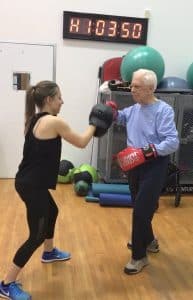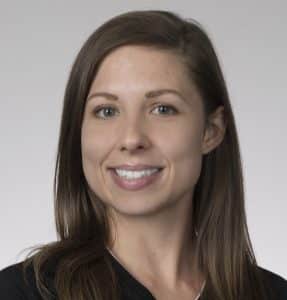Interview
Boxing for a Better Life

If you’ve heard that many physicians urge their Parkinson’s patients to take up boxing, you may have wondered why this activity would be beneficial to people whose symptoms include significant fatigue, shakiness, bad posture and weakness. The current gold standard of Parkinson’s treatment includes medication and exercise – but not just any exercise – specifically boxing training in the Rock Steady Boxing program (RSB) at the MUSC Wellness Center.
MUSC Master Teacher, Certified Personal Trainer and RSB Coach Cindi Day is incredibly passionate about her job training men and women with Parkinson’s. This passion stems from using her experience to motivate and teach patients to take on physical challenges they thought were beyond them, to then being able to manage symptoms and proceed with rewarding daily lives. “If you are persistent, you can accomplish anything,” is her message to patients.
Exercise making a difference in general well-being is no revelation, but for patients with Parkinson’s and other chronic diseases, the idea that this program can help slow the disease’s progression, protect neuroplasticity, and enhance activities of daily living while in some cases decreasing symptoms like shuffling and poor balance means the program is worth trying.
The discipline is also effective in addressing mood issues like anxiety and depression that often accompany Parkinson’s due to low levels of the neurotransmitter dopamine.
The key component of RSB is the utilization of boxing drills. The goal is not to fight human opponents but to fight back against Parkinson’s Disease. The program also includes activities that improve balance, gait, rigidity, flexibility, strength, and more. Equipment ranges from heavy bags to dumbbells and hula hoops.

But Day was determined to excel. Attending classes twice weekly turned into daily training. That led her to train for various competitions, however a hip fracture forced her to forgo ambitions of fighting competitively. This wouldn’t stop her though, because by the time her daughter (now 16), was around nine years old, Day completed her training to be a fitness specialist at Trident Technical College.
During a five-month internship at MUSC, she worked with a non-Parkinson’s patient who had multiple ailments including a shoulder SLAP tear, plantar fasciitis and neuropathy in his feet that were lessening his enjoyment of life. After one year of consistent training, the man – who was then in his late 60s – began to regain mobility, having far less pain and more confidence. Seven years later, Day is still working with this patient. Having such a profound experience with a client with visible results helped her ultimately decide on her career path.
MUSC offered her a job following her internship. At the time, MUSC offered limited training for Parkinson’s patients but recognized the need for an expanded comprehensive program. Day, with her background in boxing, was a natural choice among the new coaches sent to Indianapolis to learn the program from its founders.
RSB drew on all her interests in the rehabilitation of older patients using a modality that really made sense and worked in terms of motivating people to work toward goals most believed impossible. “I primarily train individuals with medical conditions such as Parkinson’s, rheumatoid arthritis, diabetes, and muscular and skeletal disorders, but I also teach an all-female boxing class,” she added.
MUSC’s RSB program is open to the general community with participants choosing to attend either once or twice per week. The facility also has options for one-on-one training and group exercise classes.
Coordination with physical and occupational therapy program interns enriches the program with plenty of one-on-one support. Further support is available with referrals made by MUSC neurologists as needed. And if a participant doesn’t live near downtown Charleston, there are numerous locations around the Lowcountry that offer RSB programs. Participants can borrow boxing gloves if needed, but regulars are encouraged to purchase their own.
The MUSC Wellness Center is located at 45 Courtenay Dr. Charleston, SC. You can learn more about RSB and other programs at musc.edu/hsc.
























